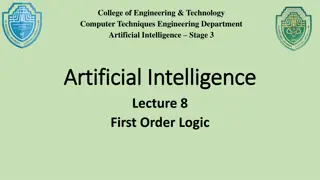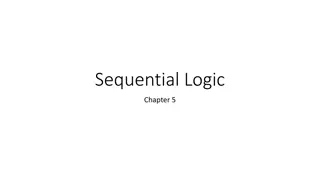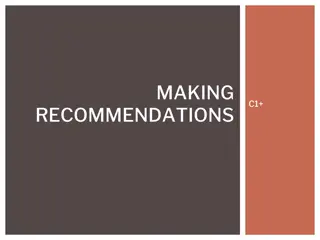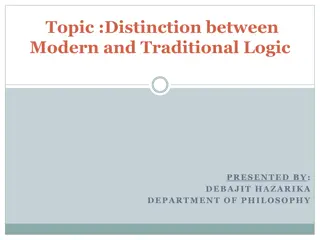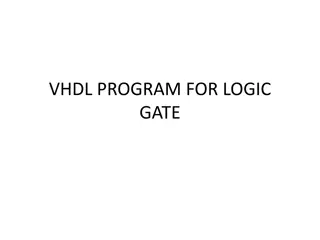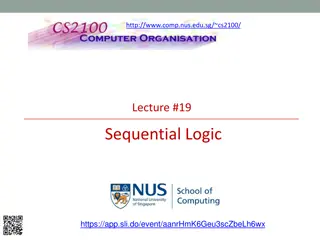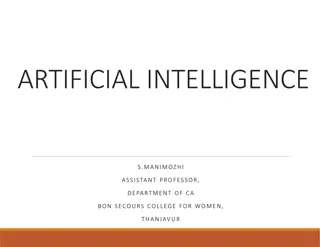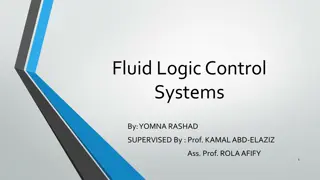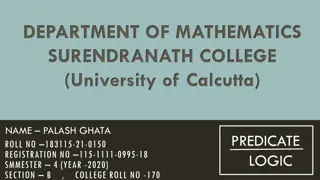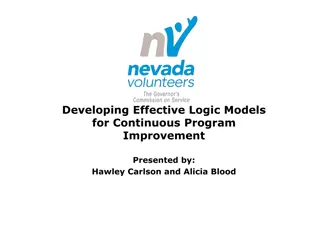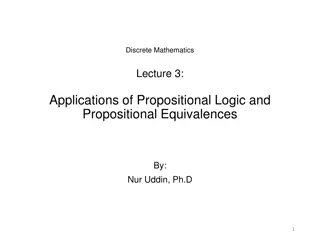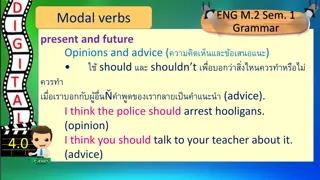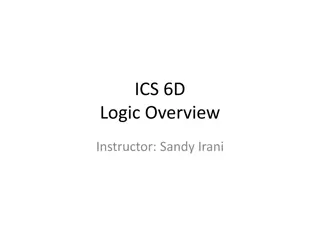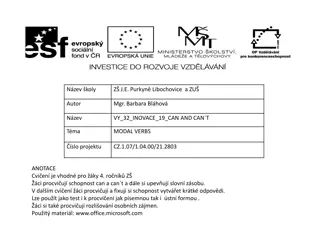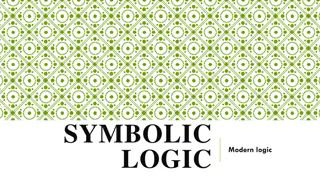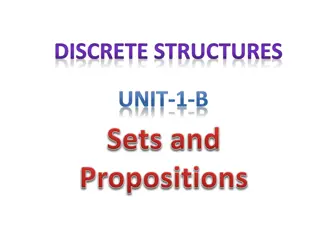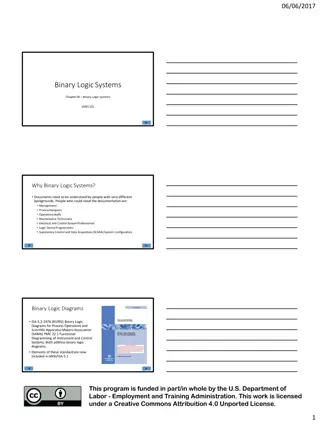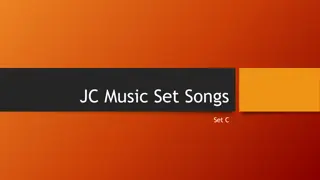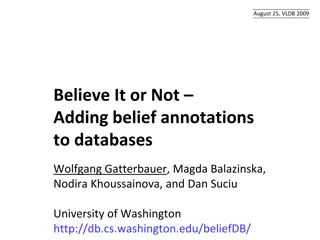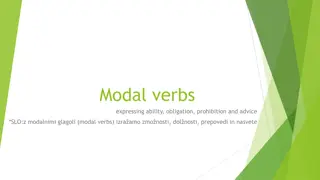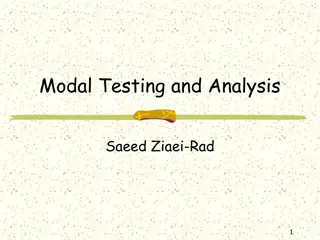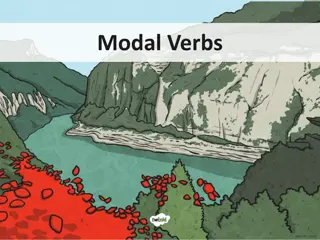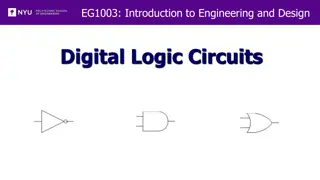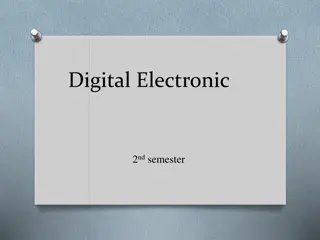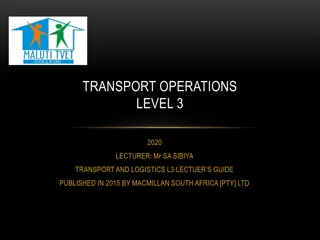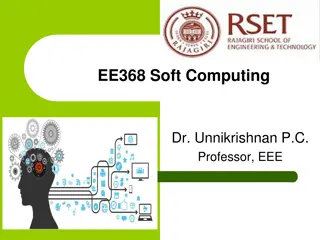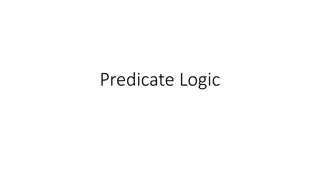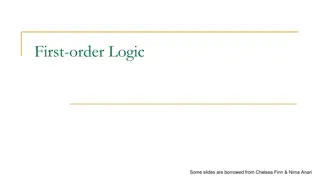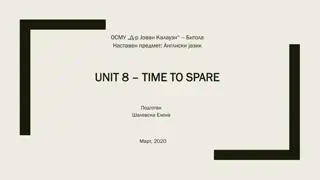Understanding First-Order Logic in Artificial Intelligence
Delve into the realm of first-order logic in artificial intelligence as a knowledge-based agent represents and deduces actions in its operating world. Explore the limitations of propositional logic and the expressive power of first-order logic, along with syntax, semantics, and models in logical lan
3 views • 27 slides
Understanding Sequential Logic Circuits in Digital Systems
Logic circuits in digital systems can be either combinational or sequential. Sequential circuits utilize storage elements along with logic gates, where outputs depend not only on present inputs but also on past inputs and internal states. They are essential building blocks, with storage registers pl
5 views • 20 slides
MAKING RECOMMENDATIONS
Providing recommendations is a crucial skill in both spoken and written English, especially for tasks like formal essays, reports, proposals, and letters. This guide covers different ways to give recommendations using modal verbs, passive voice, gerunds, and more. Get insights on modal/semi-modal ve
5 views • 16 slides
Topic : Distinction between Modern and Traditional Logic.
Logic, as a normative study, focuses on distinguishing correct reasoning from incorrect. Traditional logic, based on Aristotle's work, emphasized syllogistic reasoning, while modern logic, pioneered by figures like Leibnitz and Russell, employs mathematical methods and symbolic logic for a more adva
2 views • 10 slides
Logic Families
Logic families such as Diode Logic (DL), Resistor-Transistor Logic (RTL), and Diode-Transistor Logic (DTL) each have distinct capabilities and limitations when it comes to performing logic functions. While DL gates are simple and inexpensive but limited in functionality, RTL gates offer both normal
1 views • 22 slides
VHDL Logic Gate Programming Examples
This content provides VHDL code examples for various logic gates including AND, OR, NOT, XOR, and X-NOR gates along with their corresponding circuit diagrams. Each code snippet is accompanied by a brief explanation and a visual representation of the logic operation. The provided VHDL code can be uti
0 views • 7 slides
Understanding Sequential Logic in NUS CS2100 Lecture #19
Explore the concepts of sequential logic in Lecture #19 by Aaron Tan at NUS, covering memory elements, latches, flip-flops, asynchronous inputs, synchronous sequential circuits, and different types of sequential circuits. Delve into the distinction between combinatorial and sequential circuits, memo
3 views • 26 slides
Understanding Predicate Logic in Artificial Intelligence
In the world of artificial intelligence, predicate logic plays a crucial role in representing simple facts. It involves syntax, semantics, and inference procedures to determine the truth value of statements. Real-world facts are represented using propositions in logic, allowing for structured knowle
1 views • 19 slides
Introduction to Fluid Logic Control Systems
Fluid logic control systems utilize devices that switch fluid, like air, between outlets, providing ON/OFF outputs swiftly based on control signals. This article explores moving-part logic devices, control functions, Boolean algebra applications in control technology, and advantages of fluid logic s
1 views • 22 slides
Understanding Modal Verbs in English
Modal verbs, also known as modals, are auxiliary verbs that express attitudes and levels of certainty in English. They serve various purposes, such as indicating certainty, ability, permission, and making requests. Modal verbs like can, could, may, might, will, would, must, shall, should, and ought
0 views • 19 slides
Understanding Logic Circuits in Aircraft Systems
Aircraft logic systems follow MIL/ANSI standard logic symbols and conventions used in electronic applications. Inverters, buffers, AND gates, OR gates, NAND gates, NOR gates, Exclusive-OR gates, and Exclusive-NOR gates are commonly used in aircraft logic circuits. These gates have specific behaviors
0 views • 52 slides
Understanding Modal Verbs: Epistemic and Deontic Uses
Modal verbs, such as can, could, may, must, will, and should, play a crucial role in expressing modality in English. This content discusses the epistemic and deontic uses of modal verbs, illustrating how they convey likelihood, ability, permission, suggestions, obligations, and advice. Explore the n
0 views • 34 slides
Introduction to Predicate Logic in Mathematics
Predicate logic is a powerful tool used in mathematics to express complex relationships and assertions that cannot be adequately represented by propositional logic. It allows for the quantification of statements over a range of elements using predicates and quantifiers like universal and existential
1 views • 13 slides
Developing Effective Logic Models for Continuous Program Improvement
Explore the essentials of logic models and their significance in evaluating programs for continuous improvement, presented by Hawley Carlson and Alicia Blood. Learn about theory of change, logic model components, and using logic models for evaluation planning.
4 views • 12 slides
Applications and Equivalences in Propositional Logic
This lecture explores applications of propositional logic, including translating sentences, system specifications, logic puzzles, and logic circuits. It also defines tautology, contradiction, and contingency as types of compound propositions, along with logical equivalences. Examples and illustratio
0 views • 16 slides
Understanding Modal Verbs in English Grammar
Explore the nuances of modal verbs in English grammar through opinion, advice, and exercises. Learn how to use modal verbs like should, ought to, can, must, and may in present and future contexts. Enhance your language skills with examples and exercises highlighting the correct usage of modal verbs.
0 views • 12 slides
Understanding Logic in Mathematics and Computer Science
Logic is a branch of mathematics that deals with true or false values. It is essential for fields like computer science, aiding in AI, automated reasoning, and digital logic design. Propositions, logical operations like conjunction and disjunction, and the use of propositional variables are fundamen
0 views • 28 slides
Modal Verbs Exercise - Can and Can't Practice Activities
Enhance students' ability to use modal verbs can and can't through engaging exercises focusing on forming questions and short answers. Utilize the provided images to prompt students to complete sentences and questions with appropriate modal verbs.
0 views • 5 slides
Understanding Propositional Logic and Logical Operators
Learn about propositional logic, statements, logic operators, compound statements, exclusive-or, logical equivalence, and writing logical formulas for truth tables. Explore how to create compound statements for exclusive-or using different approaches and ensure logical equivalence. Enhance your know
0 views • 26 slides
Understanding Symbolic Logic: A Modern Approach
Delve into the world of symbolic logic where traditional and modern approaches differ. Learn how symbolic languages help overcome challenges with natural languages, leading to a clearer understanding of deductive reasoning through the analysis of premises, conclusions, compound statements, and logic
1 views • 32 slides
Understanding Propositional Logic at Kwame Nkrumah University
Dive into the world of symbolic logic and compound statements with a focus on Propositional Logic at Kwame Nkrumah University in Ghana. Explore the concepts of connectives, simple and compound statements, truth values, and more. Enhance your logical reasoning skills through a tutorial on symbolic lo
0 views • 57 slides
Understanding Propositional Logic and Mathematical Logic in Computer Science
Study the development of formal logic in computer science, focusing on propositional logic and mathematical logic. Learn about propositions, logical operators, and ways of combining statements to derive conclusions. Explore examples and understand how to determine the validity of arguments using log
0 views • 38 slides
Understanding Binary Logic Systems in Documentation
Binary logic systems play a crucial role in documentation for individuals with diverse backgrounds such as management, process designers, operations staff, maintenance technicians, and more. These systems, depicted in binary logic diagrams, provide a clear and concise representation for various prof
4 views • 16 slides
Overview of Sacred Music: Plainchant, Gregorian Chant, and Modal Music
Delve into the world of sacred music with a focus on Plainchant, Gregorian Chant, and Modal Music. Explore the history, characteristics, and unique features of these musical forms, ranging from the reverent tones of Salve Regina to the intriguing melodies of Modal Music. Discover the textures, moods
0 views • 10 slides
Managing Belief Annotations in Databases: A Modal Logic Approach
Explore the concept of belief databases that enable data curation based on modal and default logic in a relational model. The work discusses managing inconsistent views in community databases and presents a motivating application scenario to illustrate the challenges and solutions in handling belief
0 views • 34 slides
Understanding Modal Verbs for Ability, Obligation, Prohibition, and Advice
Modal verbs play a crucial role in expressing ability, obligation, prohibition, and advice in English. They help convey various nuances in meaning such as capability, necessity, restrictions, and suggestions. By exploring modal verbs like "can", "could", "must", and others, you can develop a deeper
0 views • 9 slides
Introduction to Symbolic Logic: Understanding Logical Inferences
Logic is the study of reasoning methods to distinguish between correct and incorrect arguments. Symbolic Logic involves representing logic symbolically for easier understanding and manipulation. Logical inferences help in making decisions based on reasoning chains. The content discusses the use of l
1 views • 28 slides
UBU Performance Oversight Engagement Framework Overview
Providing an overview of the UBU Logic Model within the UBU Performance Oversight Engagement Framework, this session covers topics such as what a logic model is, best practice principles, getting started, components of the logic model, evidence & monitoring components, and next steps. The framework
0 views • 33 slides
Understanding Modal Verbs in Grammar - Mega Goals 6 Unit 1 Everyone Makes Mistakes
Modal verbs play a crucial role in expressing abilities, possibilities, and obligations in English grammar. This lesson from Mega Goals 6 Unit 1 covers modal verbs, passive voice, and past models, offering a comprehensive overview through various activities and examples.
0 views • 25 slides
Understanding Modal Testing and Analysis in Structural Dynamics
Modal testing and analysis play a crucial role in understanding the behavior of structural systems under various conditions like undamped, viscously damped, and hysterically damped scenarios. This analysis involves the study of single-degree-of-freedom systems, undamped systems for free and forced v
0 views • 23 slides
Understanding Modal Verbs: Usage and Examples
Modal verbs are auxiliary verbs that are used in conjunction with main verbs to express various meanings such as possibility, likelihood, necessity, and more. Common modal verbs include may, must, could, should, and will. They play a crucial role in indicating the level of certainty or permission in
0 views • 16 slides
Understanding Modal Verbs in English
Modal verbs in English such as 'must', 'have to', 'mustn't', and 'don't have to' are used to express obligations, prohibitions, and lack of necessity. 'Must' and 'have to' convey internal and external obligations, while 'mustn't' indicates prohibition and 'don't have to' implies lack of necessity. E
0 views • 14 slides
Understanding Digital Logic Circuits and Design Principles
Explore the world of digital logic circuits with a focus on logic gates, truth tables, boolean equations, and Karnaugh maps. Learn how to design combinational logic circuits, analyze different logic functions, and solve sample problems related to digital logic. Get hands-on experience with LabVIEW a
0 views • 28 slides
Introduction to Digital Electronic Circuits and Logic Gates
Understanding digital electronic circuits and logic gates is essential for building digital systems. This content covers the basics of logic gates, digital signals, and the practical application of binary digits in circuits. It discusses the function and importance of logic gates, such as NOT gates
0 views • 17 slides
Introduction to Logical Thinking: Science of Correct Reasoning
Logic, the science of correct reasoning, explores ways to infer conclusions from assumptions and validate arguments. This course introduces logic as a tool for analyzing arguments, automating processes, and enhancing communication clarity. Through classic logic variants like propositional and predic
0 views • 30 slides
Understanding Multi-Modal Transportation in Logistics
The content covers concepts such as inter-modal and multi-modal transportation, seamless supply chains, standard containers, swap bodies, cellular container ships, and unaccompanied road semi-trailers in the context of transportation operations. It explains the meanings and functions of various mode
0 views • 14 slides
Applications of Fuzzy Logic in Soft Computing
Fuzzy logic is primarily used as the underlying logic system for decision support systems in various applications. From fuzzy controllers to fuzzy rule bases, this technology enables approximate reasoning similar to human decision-making processes. Explore the architecture and major components of Fu
0 views • 27 slides
Understanding Predicate Logic and Quantifiers
Predicate logic extends propositional logic by allowing statements to be assigned specific values. The limitations of propositional logic are overcome through predicate logic, where statements like "?. is greater than 3" have subject and predicate parts denoted as ?(?). Furthermore, predicates can b
1 views • 20 slides
Understanding First-Order Logic Fundamentals
Explore the limitations of propositional logic and delve into the syntax, semantics, and inference rules of first-order logic. Learn about predicates, quantification, and how to express relationships among objects using predicates. Enhance your understanding of how first-order logic provides a more
0 views • 42 slides
Effective Language Learning: Vocabulary, Grammar, and Modal Verbs Activities
Enhance your language skills with engaging vocabulary exercises, definitions matching, and practice with modal verbs. Dive into a variety of educational tools, improve your understanding with video explanations and PDFs, and master different types of present modal verbs. Elevate your language learni
0 views • 16 slides
